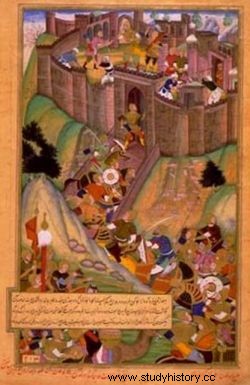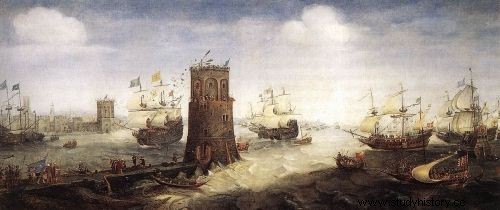b> On September 16, 1231, the Bavarian prince Ludwik I Wittelsbach died in Kelheim. Were the Assassins hired by Emperor Fryde behind the most mysterious murder of the German Middle Ages
Sources agree:on the ill-fated morning on the bridge in the city of Kelheim, an unknown man killed Ludwig I Wittelsbach, Prince of Bavaria and one of the most important people in the Reich, with a dagger. There were cases where agitated witnesses killed the murderer immediately and it was impossible to recognize the possible client - for example, it happened with the soldier who killed Wenceslaus III, king of Bohemia in Olomouc in 1306. Ludwik I's killer survived his victim a little longer. Taken to be tortured, he did not say why he murdered or if anyone sent him. In the end, he was tortured to death, and the man took his secret to the grave. It was widely recognized that he was an assassin, a representative of the notorious extremist Muslim sect.
The perfect killer
There were two reasons. First, how the homicide was committed. The Assassins often resorted to assassinations with the use of knives and daggers, and among their victims were a number of prominent persons, such as the Baghdad caliph Al-Mustarshid and the Jerusalem king Conrad of Montferrat. Second, the killer's silence despite cruel torture.

Alamut. The famous fortress of the Assassins.
All the stories about the blind obedience of the Assassins to the leader of the sect came to mind at once. For example, that at his command they could even jump into the abyss (and be killed on the spot). A witness to such an show was Henry of Champagne, nephew of Richard the Lionheart, who in 1194 paid a visit to the leader of the Assassins called the Old Man of the Mountains.
But why did the murderer travel a long way from the Alamut Fortress, the seat of the Assassins in the Elburs Mountains, to kill Ludwig Wittelsbach in Kelheim, Bavaria? The prince once participated in the fifth crusade by fighting Muslims in Egypt. However, it was in 1221, ten years before the tragic September 16, and it is difficult to find any connection between these events.
A very comfortable death
Ludwig's son and successor, 15-year-old Otto II Wittelsbach, initially suspected everyone. However, when he was disturbed by Emperor Frederick II Hohenstaufen, he guessed who was behind the murder of his father. The bad relations between Fryderyk and the murdered were no secret. Ludwik Wittelsbach, despite the favors rendered by Frederick (for example, he got his son married to the heiress of the Rhenish Palatinate), at one point in a dispute between the emperor and the pope sided with the latter. There is no doubt that on September 16, 1231, Frederick II lost an uncomfortable opponent.

Fifth Crusade. It was during her that Emperor Frederick was able to establish his first contacts with the Assassins ...
In addition, the emperor, aspiring to be the most important ruler of the Christian world, showed a unique attitude towards Islam among European monarchs of the thirteenth century. He knew Arabic, held the Saracen Guard. As British medievalist Steven Runciman wrote about him, Although he was born half German and half Norman, he was a true Sicilian by upbringing, a child of this half Greek, half Arab island.
Suspicious contacts
Importantly, he also kept in touch with the Assassins. Already in 1227, envoy Frederick II, together with a letter from his master, appeared in the Alamut fortress. He also sent 80,000 dinars as a gift. In turn, in July 1232, the emperor hosted a legation of Assassins at his Sicilian court. These contacts had a political justification. Frederick II, married to the heiress of the Kingdom of Jerusalem, was seriously interested in the events in the Middle East (he even took part in the crusade) and was concerned about the benevolent neutrality of the Assassins. In turn, the latter, aware of the threat posed by the growing Mongols, sought help from the emperor. As part of these contacts, could they do him a "little favor" of liquidating the Duke of Bavaria?
If we trust medieval sources, we will answer in the affirmative. However, researchers point out that the emperor, mainly due to the conflict with the Holy See, enjoyed a poor reputation among the then chroniclers. For this reason, they are rather cautious about the accounts of the Assassins hired by the Emperor to kill the Bavarian prince. The truth, unfortunately, was irretrievably taken by the murderer to the grave.
Sources:
Basic:
- Jerzy Hauzinski, Frederick II Hohenstauf and the Assassins. A little known episode in Muhammad al-Hamawi's account , [in:] Ars historica. Works from the history of the world and Poland , Poznań 1976, pp. 229-240
- Jerzy Hauziński, The Muslim Assassin Sect in European Literature of the Middle Ages , Poznań 1978.
- Herzogsmord in Kelheim. Das Attentat auf Ludwig I. von Bayern , "Geschichte mit Pfiff", issue 10, 2011, pp. 16-19;
Complementary:
- Runciman Steven, History of the Crusades , vol. 3, transl. Jerzy Schwakopf, Warsaw 1998.
